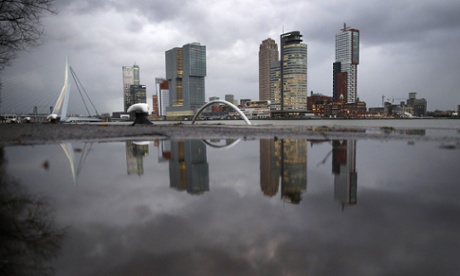
With 2014’s 100 Resilient Cities Challenge drawing to a close this week, the Rockefeller Foundation has shared some of its findings from the first round of entries with Guardian Cities. In 2013, the challenge – which seeks to identify and work with cities that are “ready to build resilience to the social, economic and physical challenges [of] an increasingly urbanised world” – received submissions from 372 cities across 78 countries, representing a total of 131 million people across the world. The 32 cities ultimately selected last year varied in their approaches to building greater resilience, and in what they identified as their most pressing concerns.
In analysing the first round of applications, the challenge’s organisers focused on the types of risk that cities felt it was most important to prepare for. Asking for “self-analysis” applications, the risks cities identified were then contrasted with existing statistical evidence courtesy of Swiss Re’s CatNet information tool.
Flooding posed the biggest worry for cities, with around 60% of applicant cities identifying it as a major concern. While that figure might sound high, in reality almost 85% of those cities are susceptible to coastal or rainfall flooding of some sort. This tendency to underestimate exposure to hazards was evident across the results, with cities tending to omit certain challenges from their list altogether despite a real threat.
The next most frequently listed natural catastrophe exposure was earthquakes. Around 30% of applicant cities are exposed to “significant earthquake risk” (defined as considerable damage to ordinary buildings, heavy furniture overturned), yet only about 15% of the applicants mentioned earthquake exposure. Even some cities that are highly exposed to earthquakes did not identify the issue as one of their major concerns – while several others overstated their exposure levels.
The results also uncovered interesting differences between geographical regions. For example, more than 32% of South American applicant cities located in high-seismic activity zones neglected to select “significant earthquake risk” as a main concern, compared with 12% of North American cities with similar risks.
Of course, environmental threats were not the only risk factors the applicant cities were wary of. Alongside food and water shortages, an ageing urban population was highlighted as a significant hindrance to a city’s success. Applicants also voiced their concern for overtaxed and underfunded public transport systems, and environmental degradation. Overall, challenge organisers concluded that, while the analysis generally showed cities “have a good sense of their risk exposures”, a significant number of cities should have ranked environmental disasters as carrying a greater risk.
As for this year’s successful applicants, 100 Resilient Cities chief executive Michael Berkowitz says he is looking for something a little different. While many of the cities selected last year had already implemented some sort of resilience plan, in 2014 the emphasis may shift towards taking on cities in the early stages of their “resilience journeys”.
They are also expecting a geographical shift: where New York, San Francisco and Rotterdam all featured in last year’s pick, this time organisers are expecting a strong batch of entries from emerging cities in India, Africa and south-east Asia. The deadline is approaching fast; will your city be chosen?
Find out more about the 100 Resilient Cities Challenge here.














